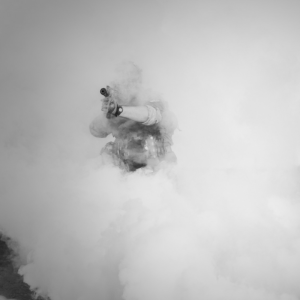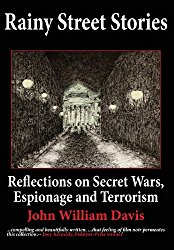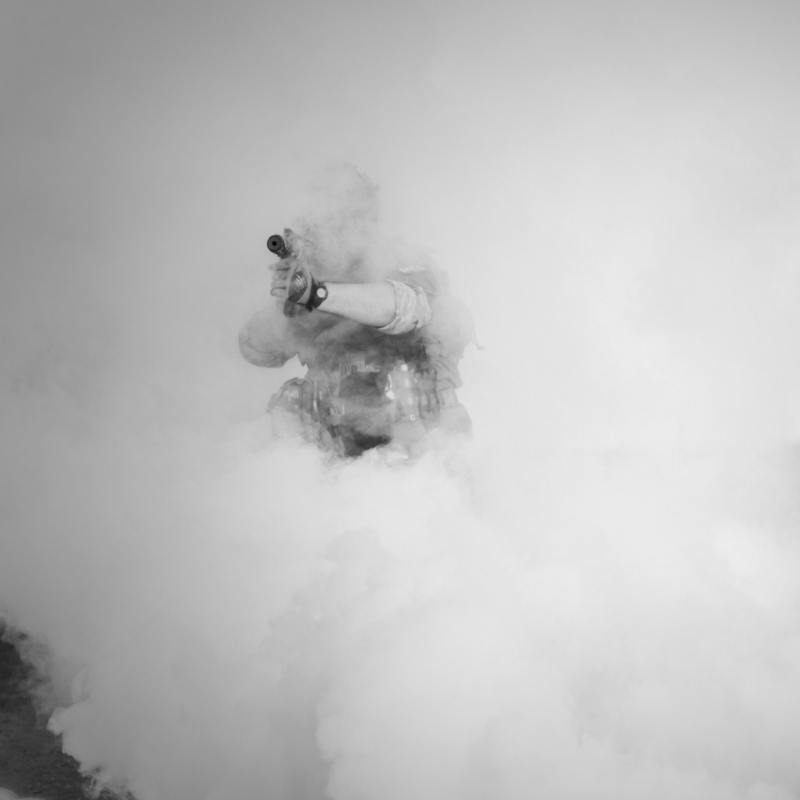Written by John Davis
Deception as Magic!
 German bombers rumble relentlessly across the night sky of North Africa following a radio beam directed from German-occupied Libya toward the British port of Alexandria, Egypt. The flight commander notes an anomaly. The beam directs him forward but he can see the lights of Alexandria to his left. The beam is known to be correct, but below him are city lights. Not only can he see the few inevitable lights in violation of blackout, he can easily see ships’ lights in the harbor. He turns toward the lights and bombs . . . nothing.
German bombers rumble relentlessly across the night sky of North Africa following a radio beam directed from German-occupied Libya toward the British port of Alexandria, Egypt. The flight commander notes an anomaly. The beam directs him forward but he can see the lights of Alexandria to his left. The beam is known to be correct, but below him are city lights. Not only can he see the few inevitable lights in violation of blackout, he can easily see ships’ lights in the harbor. He turns toward the lights and bombs . . . nothing.
In Africa during World War II, German bombers were led astray by an English deception plan that included mimicking Alexandria harbor. Creating the illusion of the actual city, lit by false house and ship lights, British officer Jasper Maskelyne, a professional magician, deceived the deadly German bombers into dropping their bombs eight miles from Alexandria, harmlessly into the sea! Remarkable as this was, few realize the principles behind it. As the great Sherlock Holmes observed, the mystery pales into insignificance once the method is revealed.
Successful deception events occur worldwide. Despite being monitored by sophisticated surveillance techniques and technology, India exploded a nuclear device under the world’s nose. In Kosovo, the Serbs used fake tanks to drain away allied air sorties. Artillery that the Vietnamese “did not have” at Dien Bien Phu in 1954 appeared as if by magic to defeat the French, after having been secretly delivered from the Korean peninsula. In each case, the adversary was well and truly deceived.
The great Chinese military philosopher Sun Tzu wrote, “All war is deception. Hence, when able to attack, we must seem unable. . . . When we are near, we must make the enemy believe that we are far way. [We must] hold out baits to entice the enemy.” Almost every U.S. Army officer has read Sun Tzu’s words. Yet, the U.S. military is little prepared for deception operations. Why? We Americans like to think of ourselves as cold realists. We like what can be seen and measured. But what if the deception is practiced on your awareness, your perception, your belief? That is where deception displays its insidious skill.
Military analysts tend to misinterpret Sun Tzu’s text. Americans are a pragmatic, formulaic, and technology-trusting people. Sun Tzu however uses verbs that refer to the mind, emphasizing appearance, belief, and enticement. How something seems or appears, what is believed, and enticement are activities discerned by the mind, not by the senses or technology. Deception in war deceives first the mind, then the eye. Few U.S. military analysts would dispute this, but fewer still offer assessments as if they believe it.
The principles of magic, which all of us-especially children-enjoy, include the following:
• Disappearance.
• Appearance.
• Transposition of objects.
• Physical change in an object.
• Apparent defiance of natural law.
• Invisible sources of motion.
• Mental phenomena.
These principles also govern deception. We all know the old adage that the hand is quicker than the eye. The magician seems quicker than the eye, but is he quicker, or has he only deceived the eye? The hand is not quicker than the eye. The magician actually beguiles the eye. In war, an opponent tries to beguile his adversary’s perception. What appears factual might actually be an artful creation with which to convince the adversary that something false is real.
Properly understood, these principles can be used to assess what occurs. To understand how these principles can be employed to deceive us helps us determine the truth behind apparent factual claims, apparent mystery. They can help us determine truth from falsehood, even when some professional attempts to deceive us.
~By MW Team Writer: John Davis
 John William Davis is a retired US Army counterintelligence officer and linguist. As a linguist, Mr. Davis learned five languages, the better to serve in his counterintelligence jobs during some 14 years overseas. He served in West Germany, Italy, and the Netherlands during the Cold War. There he was active in investigations directed against the Communist espionage services of the Soviet Union and Warsaw Pact. His mission was also to investigate terrorists such as the Red Army Faction in Germany, the Red Brigades in Italy, and the Combatant Communist Cells (in Belgium) among a host of others.
John William Davis is a retired US Army counterintelligence officer and linguist. As a linguist, Mr. Davis learned five languages, the better to serve in his counterintelligence jobs during some 14 years overseas. He served in West Germany, Italy, and the Netherlands during the Cold War. There he was active in investigations directed against the Communist espionage services of the Soviet Union and Warsaw Pact. His mission was also to investigate terrorists such as the Red Army Faction in Germany, the Red Brigades in Italy, and the Combatant Communist Cells (in Belgium) among a host of others.
His work during the Cold War and the bitter aftermath led him to write Rainy Street Stories, ‘Reflections on Secret Wars, Terrorism, and Espionage’. He wanted to talk about not only the events themselves, but also the moral and human aspects of the secret world as well.
Click to Read John’s Complete Profile


Eyes fall upon empty skies,
A landing of sum, bottomless cries.
To find in truth, the crow must fly,
Reaching the rising sun.
To rise again, from shattered gloom.
Darkness so bright, a star lit tomb.
Defeat was found, in a silent moon,
As skies fall on empty eyes.
Nothing is better than anything,
Something’s are never sure.
What’s ins
As one must stop and let one go,
Those who can’t, continue slow.
Without them, he will never show,
But thier show must go on.
The end will not be revealed,
A find will remain concealed,
For he must never begin to feel,
I chose to be alone.
As eyes fall upon empty skies,
A landing of sum, bottomless cries.
To find in truth, the crow must fly,
Reaching the rising sun.
To rise again, from shattered gloom.
Darkness so bright, a star lit tomb.
Defeat was found, in a silent moon,
As skies fall upon empty eyes.
Nothing is better than anything,
Something’s are never sure.
What’s insides will stay alive,
Innocent and pure.
Happiness is a bomb,
Just waiting to explode.
Deny and deceive it all you want,
You will never have control.
As one must stop and let one go,
Those who can’t, continue slow.
Without them, he will never show,
But thier show must go on.
The end will not be revealed,
A find will remain concealed,
For he must never begin to feel,
I chose to be alone.
And therein lies the perfect ending to an imperfect world.
I actually got quite a lot out of this article. This is a basic principle of life, that truth is “as we know it” too often.
Finding the real truth is a job that you have to do yourself. And you have to be honest with yourself while doing it.
For me, it seems to work the best when I boil everything down to the salt of the thing. Truth seems to almost always end up being much simpler than all the illusions around it.
This can be applied to everything, from war to politics to games. “Everything is a game” comes to mind. Only it most often is much more serious than just a game.
Hello, Buckeye Bob.
The seemingly endless pursuit…”separating the wheat from the chaff”…the truth from the lies…the Gold from The Rock.
The Truth is there to find…and certainly worth the Effort.
Typically…even just a simple scratch of the surface of most peoples’ lives awakens
“Thoughts that do often lie too deep for tears”. – Wordsworth
What a marvelous turn of words. And truer words were never spoken.
Yes, it’s worth the effort. No matter how hard that effort is.
Because there are plenty of forces out there with bad intentions.
A daily chore in an effort that never ends. But does improve in a “do the best you can” way. It’s essential for a better life and defense against harmful intent.